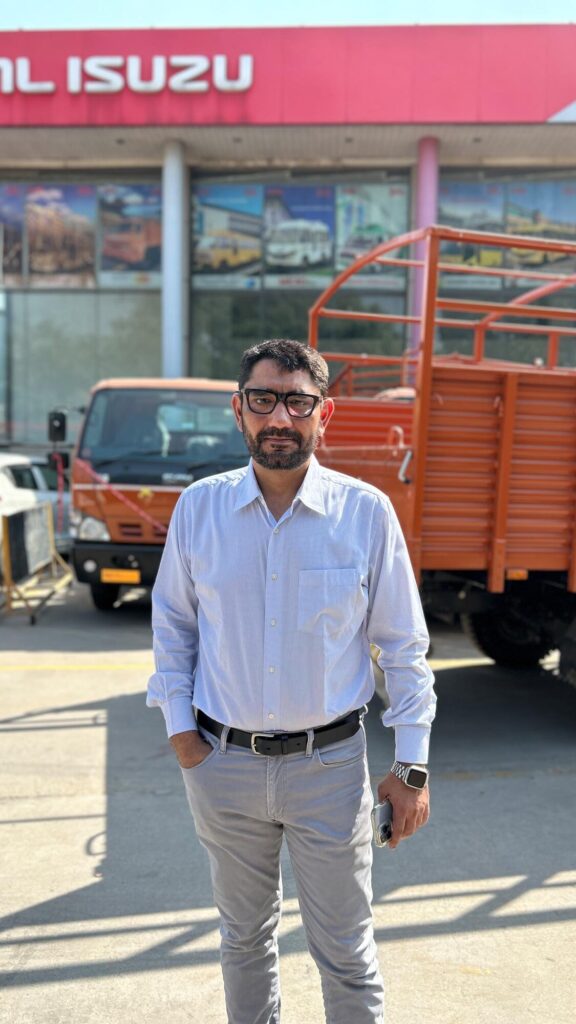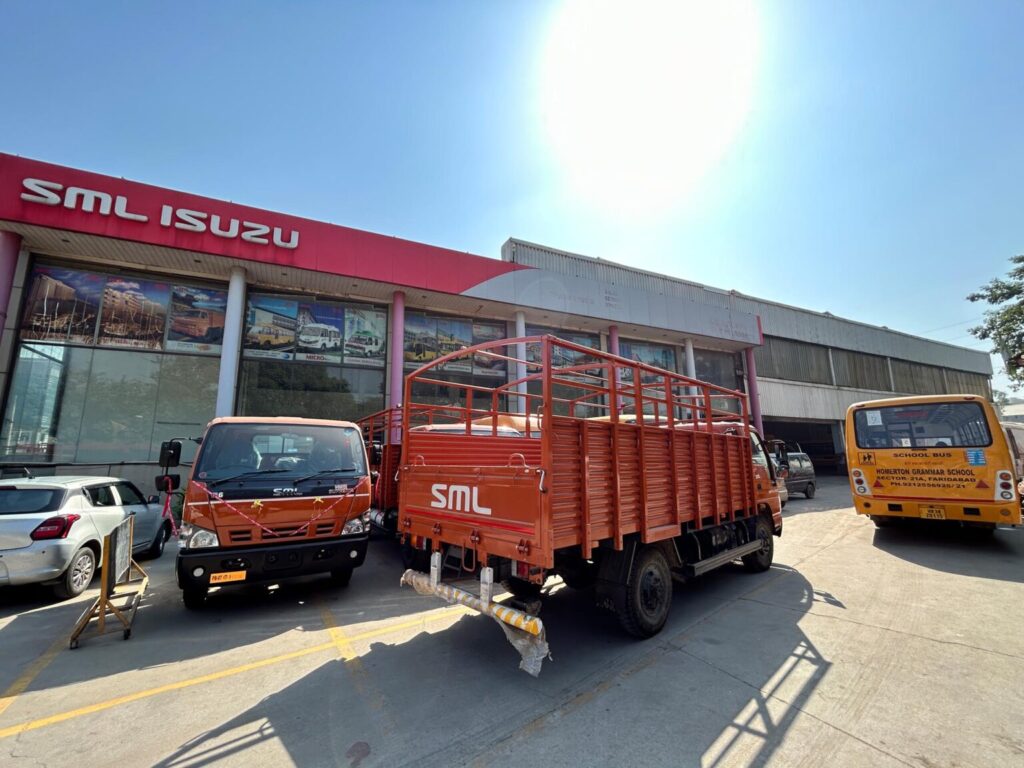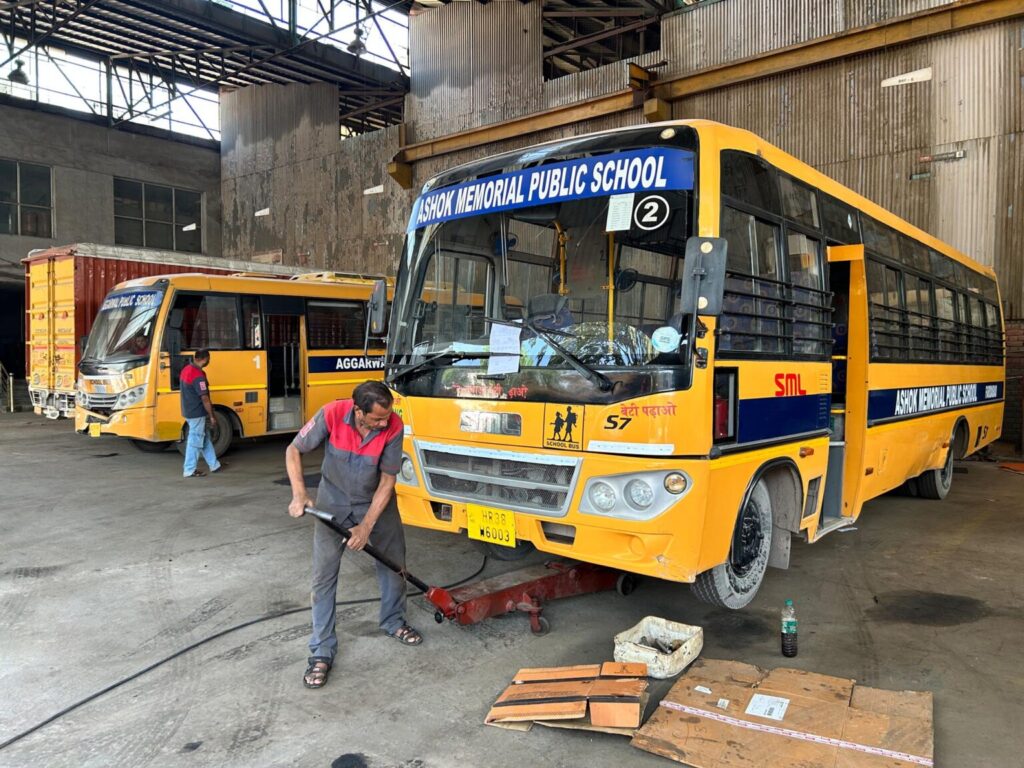
HKS Automobiles Pvt. Ltd. has carved a notable presence in the commercial vehicle space, with a journey that began in 2001 when the dealership was established. The company, the number one dealer partner of SML Isuzu in Delhi-NCR, is now led by Amit Barar, who, alongside his brother Rajan Barar, launched the dealership with a vision to provide top-quality commercial vehicles. The inception of HKS Auto was an interesting one, built upon their experience in the body fabrication business for Swaraj Mazda. “It was a natural progression from body building for Defense vehicles to getting an opportunity to take on the dealership for SML Isuzu,” says Amit. Their first significant order, the supply of 500 4×4 ambulances for the Defense sector, opened the door to their long-term partnership with the brand. Over the years, HKS Auto’s growth has been substantial, despite challenges along the way. In an exclusive interview with Abhilash U., Amit shares insights into the company’s evolution and its vision for the future.
The impact of the COVID-19 pandemic was particularly tough, affecting vehicle sales and business operations. “The journey after COVID has been a roller coaster ride,” Amit acknowledges, reflecting on the struggles the industry faced. Despite these hurdles, HKS Auto is recovering and expects to return to pre-COVID sales levels soon, with a target of reaching 90-100 vehicles sold per month in the upcoming quarter.
Building the Brand from the Ground Up
When asked about their choice of SML Isuzu as their principal brand, Amit explains that their decision was rooted in the long-standing relationship with the manufacturer. “We didn’t initially have any dealership background, but we had years of experience in bus body fabrication. When the opportunity for the dealership came, we grabbed it with both hands,” says Amit.

Their focus on building a brand presence in the Faridabad and Delhi NCR region proved challenging at first but gradually led to substantial success. Amit notes that selling buses was easier due to their in-house bodybuilding unit, which allowed them to offer custom-built options for clients. However, establishing a foothold in the truck segment, particularly in light commercial vehicles (LCVs), required more effort. “It took time to build trust in the truck market, but with consistent effort and the support of SML Isuzu, we’ve managed to carve a niche for ourselves,” he adds.\
HKS Auto currently operates multiple outlets across the Delhi NCR region, including its flagship 3S showroom in Faridabad, which was one of the first commercial vehicle showrooms in the area. “This was the first commercial vehicle showroom in Delhi NCR, and it set the stage for us,” says Amit. The dealership now also operates a larger facility in Greater Noida, capable of displaying up to 50 vehicles at a time, with 20 service bays to handle customer needs.
One of the core reasons behind HKS Auto’s success is its strong focus on customer satisfaction, especially in the after-sales service department. Amit recognizes that a good service network is key to retaining customers and expanding the business. “Customer satisfaction is paramount. If a customer is dissatisfied with service, they can cancel a large order. We focus on ensuring our customers are happy, not just at the point of sale but throughout their ownership,” says Amit. The dealership has invested in ensuring their service capabilities are top-notch, with 24/7 service support and fast-response breakdown assistance. They also work closely with SML Isuzu to ensure customers receive timely support, whether it’s through local service centres or by dispatching parts across the country when needed.

The availability of skilled manpower, especially in a country like India, can be a challenge for many businesses, but HKS Auto has been fortunate in this regard. “Our workforce is incredibly loyal, with most of our staff having been with us for over 20 years. During the COVID period, we made sure no one was laid off, and this kind of employee retention has really strengthened our team,” Amit shares. This dedication to their workforce has fostered a culture of long-term commitment and reliability. HKS Auto’s success is also attributed to its investment in ongoing staff development, ensuring that their team is always equipped to meet evolving customer and industry demands.
Navigating Industry Challenges and Technological Innovation
Despite the ongoing challenges, such as the rising costs due to new regulatory requirements like Euro 6 norms, HKS Auto has managed to adapt. Amit points out that price increases have affected the entire industry, but customers have understood that such changes are inevitable given the new regulatory environment. “It’s a challenge when prices increase, but as long as customers see the value in the product, they will adapt,” he says. Additionally, the introduction of new technologies and features in the vehicles, such as fire alarm protection systems in buses, has added to the value proposition.

In terms of unique selling points, HKS Auto differentiates itself through its custom-built bus options and strong service infrastructure. “We are the only dealership offering ARI-approved bus body fabrication in the region. We can provide customers with highly specialized vehicles, which other dealers cannot,” says Amit. They also offer a range of LCV options, emphasizing the importance of service and customer satisfaction to drive repeat sales. “We’ve faced numerous hurdles, but the key to success in this industry is consistency and customer trust. Our customers know that when they buy from HKS Auto, they’re not just getting a vehicle—they’re getting a partner in their journey,” he says confidently.
Looking ahead, Amit is optimistic about the future, despite the ongoing challenges. HKS Auto’s journey from a small-scale bodybuilder to one of the leading commercial vehicle dealerships in Delhi NCR is a testament to the hard work, vision, and resilience of its leadership. With a strong foundation in customer satisfaction, a focus on service excellence, and a dedication to product quality, HKS Auto is poised for continued growth and success in the years to come.
“Our mechanics, electricians, and service engineers are highly trained to handle everything from Euro 2 to Euro 6, OBD1 to OBD2, and beyond. They are well-maintained and constantly updated through training sessions that ensure we meet the changing needs of the market,” Amit notes. The company’s commitment to staff development is clear, with nearly 125 employees who have been with the company for over two decades. This long tenure fosters a deep sense of trust and loyalty. Amit reflects on this saying, “It’s not just about working at a company; it becomes a family. People know that when something is asked of them, it will be done—there is a real sense of belonging.”
HKS’s focus on training extends beyond their core team. The company also runs a training centre to educate co-dealers, mechanics, and workshop managers. “When the transition from Euro 4 to Euro 6 took place, we made sure our team was equipped to handle it. We brought in co-dealers, mechanics, and works managers to get them up to speed on the latest technologies and standards,” Amit explains. The company’s setup is expansive, with ample space for training and servicing vehicles, including a fleet of service vans equipped to handle roadside issues.
The commercial vehicle sector has undergone substantial changes over the past few years, particularly with the shift from older emissions standards (Euro 3 and Euro 4) to the more stringent Euro 6 standards. Amit acknowledges the challenges posed by these changes, particularly when it comes to customer understanding and acceptance of rising costs. “The transition from Euro 3 to Euro 6, and later from Euro 6 to OBD1 and OBD2, was not easy. Initially, it was difficult to explain to customers why the price of vehicles was increasing so frequently,” he admits. “But over time, as customers have seen the benefits of these changes, they have become more accepting. Now, they recognize that these changes are crucial for the environment and for the long-term durability of the vehicles.”
The company has not only adapted to these regulatory changes but has also embraced innovations that cater to evolving customer demands. The introduction of advanced safety features, such as fire alarm protection systems in school buses, is a prime example. “When customers saw the value of these safety features in new vehicles, they understood the importance of the changes, and now they demand them,” Amit explains. The shift toward electric vehicles (EVs) in the industry is another area where HKS is positioning itself for future growth. However, Amit remains cautious about the current feasibility of EVs for commercial applications. “For commercial vehicles, especially school buses and transporters, EVs are still not viable due to their high costs—an electric bus can cost upwards of Rs. 1.5 to 2 crores,” he states. “However, by 2025, SML Isuzu plans to introduce its electric bus, and they are also working on a bigger diesel engine for their trucks to meet new market demands.”
Expansion Plans and Vision for the Future
Amit also highlights the impact of government policies, such as the newly introduced scrap policy, which encourages vehicle owners to trade in old vehicles for discounts on new ones. “It’s challenging to convince customers to scrap their old vehicles, especially in regions like Delhi NCR, where CNG vehicles dominate. The cost of a new vehicle has risen sharply, so customers often choose to keep their old vehicles running for as long as possible,” he says. Despite this, HKS continues to educate its customer base on the long-term benefits of scrapping old vehicles and investing in newer, more efficient models.
As the company looks toward the future, Amit is optimistic about HKS’s expansion plans. “We’re looking to expand into new areas where SML Isuzu vehicles have little to no presence. In the next financial year, we’ll be opening new outlets to capture those markets,” he shares. HKS is also focused on strengthening its service infrastructure, particularly in Delhi, where it plans to open a new 2S service centre (service and spares) to replace a facility affected by waterlogging. “When we enter a new market, the primary concern of customers is always service.
We believe in providing not just a product but a robust after-sales network,” Amit adds.
With an eye on both the present and the future, HKS is positioning itself to meet the ever-evolving demands of the commercial vehicle market. Amit concludes with a forward-looking statement: “We plan to grow further by introducing new products, expanding our footprint, and continuing to focus on the training and satisfaction of our employees and customers alike.” The company’s commitment to staying ahead of the curve in terms of technology, service, and customer satisfaction ensures that it will remain a key player in the commercial vehicle sector for years to come.